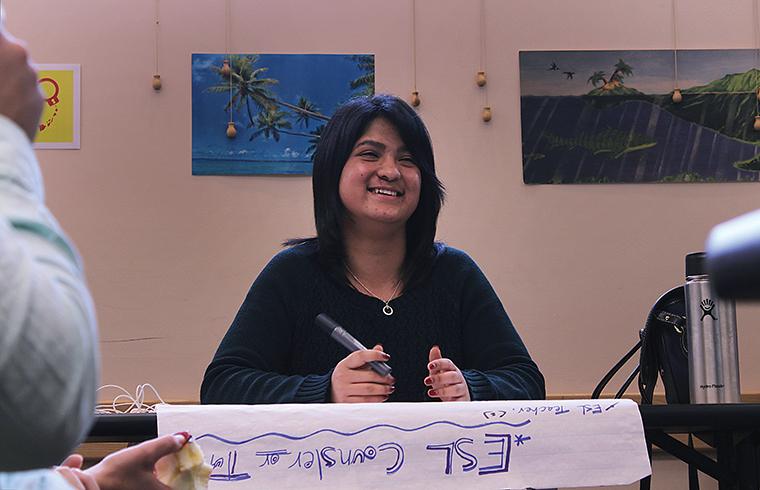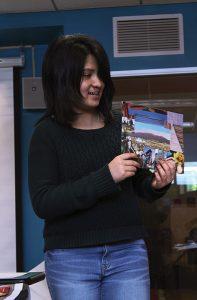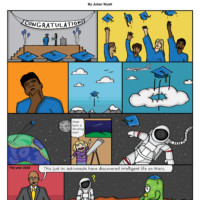
American Center, Grant senior Sagen Maharjan stood at the back of the room to present her end-of-the-year International Youth Leadership Council (IYLC) project. High school students sat at tables together while the instructors lined the side walls.
Maharjan outlined the mission of her project: hire a counselor specifically for the English as a Second Language (ESL) community at Grant High School. Since April, Maharjan had conducted surveys and interviews with Grant staff and ESL students to get feedback on her project. She says she’s excited to have the opportunity to make a difference for other ESL students.
The purpose of having an ESL counselor is “so that the ESL students can get more support,” Maharjan said to her peers.
The 20 or so teenagers listened to Maharjan and nodded in agreement, as a former IYLC student filmed the presentation with an iPad. As Maharjan ended her presentation, an IYLC advisor clapped excitedly and students started drilling her with questions.
Maharjan says her work with IYLC has helped her find strength in herself.
“Being able to become really close (with the) group has been a huge impact on myself because I’m really shy, and after joining IYLC, I feel like I gained more confidence,” says Maharjan. “I started knowing them well, and having to work with other people has really inspired me to be who I am and showing the type of girl I am.”
At the age of 12, Maharjan moved to the United States from Nepal. The move was pivotal in her life, forcing her to learn a new culture. Maharjan struggled navigating the language barrier and finding her voice in a new community.
This began to change as Maharjan became involved with the IYLC. Through three years of involvement with IYLC, Maharjan strengthened her leadership skills. Now, she’s using those skills back at Grant.
Even though she’s graduating from Grant this year, Maharjan feels her work with IYLC and ESL isn’t over. After this year, Maharjan hopes to become a paid employee of IYLC and later go into teaching.
“I really like helping people. I want them to get support they want, and that leads me to become a teacher because (of) seeing how much I like helping other people and students,” says Maharjan.
Born to Gyani and Keshab Maharjan on October 22, 1998, Maharjan grew up in Patan, Nepal, with her younger sister Yogen Maharjan. The family lived in a bustling part of town, where there were always cars honking, people yelling to each other from their mud houses and kids running around. Her parents also owned a popular grocery store in Patan, so “Maharjan” was a well-known name in their community.
Growing up, Maharjan would go to school from Sunday to Friday, where she learned in Nepali and took beginning English reading and writing classes.
Her sister, Yogen Maharjan, struggled in school. Yogen has a disability and has difficulties walking and reading. In Nepal, there were few resources the family could look to for support. On top of that, education in Nepal was expensive because it’s not funded by the government.
Later on, Maharjan started modern Nepali dance at school. Even though she enjoyed it from the start, she struggled to master the steps and moved to a different class. “I used to be really stiff because it was my first time dancing,” says Maharjan. She later started practicing traditional Nepali dance.
While Maharjan loved Patan, her parents were looking for more. They wanted to provide better opportunities for their daughters and were searching for more work.
“In Nepal, the work is really low because so many people wants to work. And a lot of the people from the cityside comes to the city just to get work and find jobs,” says Maharjan. “But (in America) you can work in the store or anywhere.”
In 2006, Maharjan’s father, Keshab Maharjan, moved to the United States alone in search of a better life for his family. Still in Nepal, Gyani Maharjan transferred Sagen Maharjan to an English school to strengthen her reading and writing skills in preparation for their trip to the United States.
Along with her mother and sister, Maharjan moved to America in August of 2011. Leaving Nepal was bittersweet for Maharjan. “It was really exciting and hard at the same time,” she says. “I felt nice coming here, but it was sad because I had to leave my family … it was really sad to let go with my friends.”
With previous English experience and her dad and two of her uncles already living in Oregon, the transition from Nepal wasn’t too stressful. “It wasn’t that hard, I used to translate from Nepali to English, from English to Nepali, all the time. So I kind of got used to it,” says Maharjan.
The move to America was beneficial for the whole family. “It’s a lot easier now because it’s not a lot of work, because (Yogen’s) able to go to school, and my parents won’t have to worry about her getting hurt and stuff like that because in Nepal, there was no one to support her,” says Maharjan.
A month later, Maharjan started seventh grade at Fernwood Middle School, which presented a new challenge. “It was really hard, and some of the time I had to ask my friend who was sitting right next to me, ‘What does this mean?’ They were really helpful, and that’s what I liked about it, because I learned new words everyday.”
At Fernwood, Maharjan entered ESL, a program that provides immigrant students a support class for English and academics. “It was really helpful because the teacher just did not help me with my English, he also helped me with my homeworks and all the struggles that I was going through,” she says.
But Maharjan continued struggling with language barriers, and as a result, she kept to herself. Everyday, she walked to classes alone and sat in the back of classrooms. “I was scared to talk to (classmates) unless they talked to me. I avoided people,” says Maharjan.
In 2013, Maharjan was promoted from Fernwood Middle School and started high school at Grant. Still in the ESL program, Maharjan met Marta Repollet, the ESL teacher. “Sagen never said a word. I remember (she was) just very afraid to speak up, afraid to say anything,” says Repollet.
For many immigrants, fear of embarrassment causes them to hide their personality. MaLynda Wolfer, a Grant math teacher, met Maharjan her freshman year in a math class and remembers seeing her work through her transitions. “I quickly observed that she was really shy and quiet, reserved. Didn’t speak out much or seek help in class but was quick to come and use time like flex time or after school,” says Wolfer.
But while she was quiet in school, Maharjan started becoming more active in her community. She started taking taekwondo – an art form she first began back in Nepal – at a Northeast Portland martial arts/taekwondo school run by her uncle, Diwakar Maharjan.
By 2013, Maharjan was helping out in lower level classes. “My uncle just told me to come and help out in the class. I usually helped out in the kids’ class … Make them focus or help out kids who needs a lot of support,” she says.
Through taekwondo, Maharjan started becoming more outspoken. “She has to perform for the promotion, and she got more confidence (from that),” says Diwakar Maharjan. “In taekwondo especially, she has been coming in and talking to kids and teaching and helping and stuff. She is motivated because kids like her.”
She also continued learning Nepali dance and performing at events for Portland’s Nepali community to stay connected with her culture. “Even though I don’t have a professional dance teacher who can teach me every single step, I still watch YouTube and try to practice by myself,” she says.
At school, ESL became a familiar space for Maharjan and she started making new friends. “She’s actually the first person I met when I came here. She started asking how I am and where I’m from and stuff,” recalls Yanet Asghedom, a Grant senior who recently exited the ESL program. “We started talking about when we came here, how long we been here, what middle schools we went to and all that.”
Towards the end of her freshman year, Maharjan heard about a conference for ESL students from one of her ESL classmates. With Repollet, some of Grant’s ESL students were able to attend the conference.
“It was really fun seeing all those people with a different ethnic background and being an immigrant to this country, it was a first time I saw that many immigrants,” says Maharjan. “Even the group of people who introduced the workshops, they were from different countries too, and some of those people understood what we had been through.”
The conference caught her interest, and at the beginning of her sophomore year, she joined the International Youth Leadership Council, the group that hosted the event. IYLC gives high school English learners the chance to meet other ESL students and find ways to improve their educational experiences. Being one of the few members from Grant, Maharjan didn’t know many people and was nervous to join. But soon she began opening up.

“She started off like a lot of our students, somewhat shy and a little bit hesitant to share. But she’s always been a very strong presence in the council,” says Francisco Garcia, the leader of IYLC. “Once she warmed up to what we’re trying to do and seeing that she wasn’t alone in our efforts, she was a very dynamic presence in planning for our conference.”
During Maharjan’s sophomore year, Nepal was hit by a 7.8 magnitude earthquake. While nobody she knew was hurt, Maharjan’s initial fear drove her to start a fundraiser. “I think Sagen, with the unfortunate events with the earthquake, felt, ‘I have the power to do something.’ And she did, independent of anything we have done (in IYLC),” says Garcia.
With three other students, she talked with Grant’s administration and teachers to sell T-shirts reading “Pray for Nepal.” The drive was a success.“We got to raise $600, just from Grant, and I was really happy about that,” says Maharjan.
As Maharjan stayed busy with IYLC, she continued her ESL class, getting more help with her writing and speaking. “I’ve seen her gain more confidence to deal with her struggles academically and get through them. ‘Cause it hasn’t been easy for her. She’s taken pretty rigorous classes,” says Repollet.
By her junior year, Maharjan was known as a leader at school and IYLC. She mentored for classes, helped new students with their transitions into a new country and spoke more in class.
Repollet remembers two freshmen who moved to Grant in the middle of the year from Bangladesh. The students had already exited ESL, but still needed monitoring. Maharjan volunteered to help them during their transition and met with them about once a week.
“She has this intuitive sense of when a student needs help. So Sagen took on that role within the freshman class. She just worked with them, helped them get their notebooks set up, help them get acquainted with the routine of the class so they didn’t feel so lost. She knew what they would be coming in with. Those anxieties about the language and not knowing anybody, because of her own experience,” says Repollet.
Outside of her work with ESL, Maharjan continued helping in lower-level taekwondo classes. Then, in 2015, her uncle convinced her to sign up for an international taekwondo competition. The competition, organized by her uncle and his friends took place in London where students across the world could compete.
Over the course of ten days, Maharjan performed different skills called “forms” and received multiple gold, silver and bronze medals. However, the competition wasn’t why she loved the sport. Maharjan had come to love helping out in classes, and it sparked an interest in teaching. Later, in 2016, Maharjan achieved the highest ranking in taekwondo: a black belt.
Her senior year, Maharjan continued to be heavily involved in her work with ESL. Since April, Maharjan has been working on a project through IYLC to get an ESL counselor at Grant. After interviewing teachers and counselors and surveying her ESL classmates, Maharjan gathered data about people’s thoughts on having an ESL counselor.
She says having an ESL counselor will provide ESL students with support on both current and post-high school issues. “I have been in that situation, so that’s why I wanted to make change,” says Maharjan.
For Maharjan, having Repollet as her ESL teacher has been helpful, but when it comes to college and career resources, it can be hard not having someone who specifically works with those problems. “(Ms. Repollet) can read your paper and stuff like that and edit your essay, but if you need help with college and stuff like that, counselor is the best choice for that,” she says.
Maharjan recognizes that she probably won’t be able to finish the project before she graduates. During college, Maharjan hopes to return to IYLC to help the next generation of ESL students. “If I don’t finish this process this year, next year I might be coming back to Marshall and doing some of the work with the district as well at IYLC,” she says.
After graduating, Maharjan will go to Portland Community College and hopes to study education. “I want to be an international teacher. I want to travel around the world and teach English,” she says.
Since her move to the U.S., Maharjan has developed leadership skills through both IYLC and taekwondo. These opportunities have shown her how to lead others at Grant, and ultimately led to her dreams of teaching.
“I know being a leader is a really hard thing, and I want people to not feel the way I felt,” says Maharjan. “Being an ESL students and having to take care of everything by yourself. I want the students in younger generations (to) have better education and better service.” ◆



